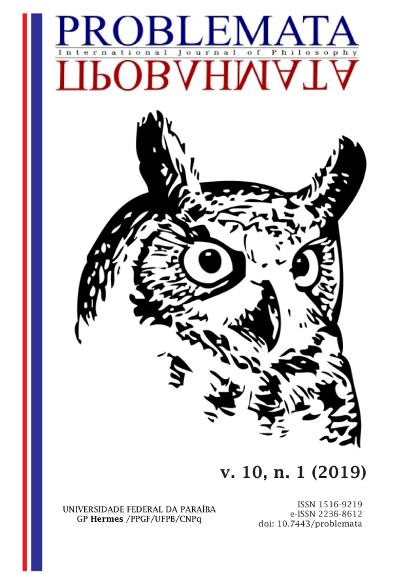EXISTENTIAL INDIVIDUATION, HISTORICALITY, AND THE ENIGMA OF MOVEMENT
DOI:
https://doi.org/10.7443/problemata.v10i1.43819Keywords:
Heidegger. Individuation. Historicality. Movement. Modality.Abstract
In the existential analytic of Being and Time, Heidegger interpreted human existence as determined by existential possibilities. However, a corresponding concept of existential individuation was not presented. In this article, I outline an interpretation of the existential notion of individuation based on the historicality of existence. My hypothesis is that the occurrence of personal existence is the formation of individuation in the mode of being of existence. Over the course of his existential analysis of the structure of the historical movement, Heidegger identified a limit that was called “the enigma of movement”. Without intending to solve or eliminate this enigma, I present an analysis of the modal dimension of the historical mobility of existence, in order to open a new perspective for developing an existential notion of individuation.
Downloads
References
CERBONE, David. Composition and constitution: Heidegger’s Hammer. Philosophical Topics, vol. 27, n. 2, p. 309-329, set./nov. 1999.
CROWELL, Steven. Authentic historicallity. In: CARR, D.; CHEUNG, C.-F. Space, time, and culture. Dordrecht: Kluwer Academic Publishers, 2004, p. 57-71.
HEIDEGGER, Martin. Sein und Zeit. Frankfurt: Vittorio Klostermann, 1977.
______. Die Grundbegriffe der Metaphysik. Welt – Endlichkeit – Einsamkeit. Frankfurt Vittorio Klostermann, 1983.
______. Der Begriff der Zeit. Frankfurt: Vittorio Klostermann, 2004.
______. Wilhelm Diltheys Forschungsarbeit und der gegenwärtige Kampf um eine historische Weltanschauung. In: HEIDEGGER, M. Vorträge. Teil 1: 1915-1932. Frankfurt: Vittorio Klostermann, 2016a, p. 215-251.
______. Philosophische Anthropologie und Metaphysik des Daseins. In: HEIDEGGER, M. Vorträge. Teil 1: 1915-1932. Frankfurt: Vittorio Klostermann, 2016b, p. 105-157.
KELLY, Howard. Heidegger the metaphysician: modes-of-being and Grundbegriffe. European Journal of Philosophy, v. 24, n. 3, p. 670-693, set. 2014.
MCDANIEL, Kris. Ways of being. In: CHALMERS, D.; MANLEY, D. & WASSERMAN, R. Metametaphysics: new essays on the foundations of ontology. Oxford: Oxford University Press, 2009, p. 290-319.
MCMANUS, Denns. Ontological pluralism and the Being and Time project. Journal of the History of Philosophy, vol. 51, n. 4, p. 651-673, out. 2013.
O’BYRNE, Anne. Birth and death. In: RAFFOU, F.; NELSON, E. S. The Bloomsbury companion to Heidegger. London: Bloomsbury, 2013, p. 263-267.
VERENGET, Einar. The Presence of Husserl’s theory of wholes and parts in Heidegger’s phenomenology. Research in Phenomenology, vol. 26, n. 1, p. 171-197, 1996.
REIS, Róbson. O outro fim para o Dasein: o conceito de nascimento na ontologia existencial. Natureza Humana, vol. 6, n. 1, p. 53-77, jan./jun. 2004.
______. Aspectos da modalidade. A noção de possibilidade na fenomenologia hermenêutica. Rio de Janeiro: Via Vérita, 2014.
______. Historicidade e necessidade existencial em Ser e tempo de Martin Heidegger. Filosofia Unisinos, vol. 17, n. 1, p. 2-12, jan./abr. 2016.
ROUSE, Joseph. How scientific practices matter. Chicago and London: The University of Chicago Press, 2005.
RUIN, Hans. Enigmatic origins. Tracing the theme of historicity through Heidegger’s work. Stockholm: Almqvist & Wiksell International, 1994.
THOMPSON, Ian. Death and Demise in Being and Time. In: WRATHAL, M. The Cambridge Companion to Heidegger's Being and Time. New York: Cambridge University Press, 2013, p. 260-290.
WALTON, Roberto. Temporeidad y historicidad. In: RODRÍGUEZ, R. (ed.). Ser y Tiempo de Martin Heidegger. Un comentario fenomenológico. Madrid: Tecnos, 2015, p. 371-395.
Downloads
Additional Files
Published
Issue
Section
License
Authors who publish with this journal agree to the following terms:
- Authors retain copyright and grant the journal right of first publication with the work simultaneously licensed under a Creative Commons Attribution License that allows others to share the work with an acknowledgement of the work's authorship and initial publication in this journal.
- Authors are able to enter into separate, additional contractual arrangements for the non-exclusive distribution of the journal's published version of the work (e.g., post it to an institutional repository or publish it in a book), with an acknowledgement of its initial publication in this journal.
-
- Authors are permitted and encouraged to post their work online (e.g., in institutional repositories or on their website) prior to and during the submission process, as it can lead to productive exchanges, as well as earlier and greater citation of published work (See The Effect of Open Access).





